How workplace leaders can shape a workplace culture of wellbeing and mental flourishing

Leaders are key to shaping workplace culture. They set the mood and tone of work environments, making or breaking the development of a culture of wellbeing. Employees look to leaders for what behaviour, customs, attitudes and ways of communicating are favourable and acceptable in a work environment.
During the COVID-19 crisis when many people were feeling anxious and uncertain about their job security, physical and mental health, workplace leaders needed to step up and lead. According to a national survey of 1,015 Australians conducted by McCrindle during the pandemic, the most important qualities of a leader during a crisis are being completely open and honest with sharing information (50%), being prepared to make the tough calls, make them early and back themselves (50%) and lead with strength and communicate confidence (36%).
Great leaders not only observe the changing times; they understand them. They don’t just get
impacted by the trends; they proactively respond to them. They not only adapt their own direction based on the shifting landscape; importantly, they lead others on the journey.
We need leaders, not bosses.
Workers are speaking up on the type of leader they best respond to. Collaborative leadership is the preferred style above authoritarian or hierarchical. Our research of employed Australians showed that those who experience collaborative leadership styles in their workplace are more likely to recommend their workplace to others, be more engaged in their current role and more likely to say they will be there in two years’ time than those who experience authoritarian leadership styles.
Workers prefer a people and goals focussed leader than one more focused on output or profit. A focus on people correlates to higher engagement, advocacy and retention.
When it comes to shaping a workplace culture of wellbeing and mental flourishing, it is desirable that leaders bring intelligence, but it is essential that they exercise empathy. Leaders who focus on the different aspects of the engagement equation – culture, purpose and impact, are best placed to shape an engaging workplace culture that workers want to be a part of.
The engagement equation = culture + purpose + impact
Culture
Culture is how an organisation does things. Culture is influenced by everything from leadership to management, workplace practices, policies and people. If a workplace has a negative or unhealthy culture it can easily flow out into other aspects of the organisation, including employee interaction with clients and customers as well as output.
According to our national survey of 1,160 employed Australians, for more than half (58%) organisational culture and values matters more to them than remuneration! While workplace culture is important for all workers regardless of age, it is key to attraction and retention of the emerging generation of employees, who are looking for multiple needs met in and through their work.
Purpose
According to our national survey of 1,160 employed Australians, more than half (55%) said that a strong mission, vision and values are extremely or very important to them in their place of employment.
In another national survey we conducted of 1,001 employed Australians, 57% strongly/somewhat agree that they find purpose and meaning in their work. Similarly, 54% strongly/somewhat agree that what they do for work is making a difference in people’s lives. While these are positive findings, it also indicates that just under half of workers do not find purpose and meaning in their work or feel as though what they do for work is making a difference in people’s lives. When asked whether efforts are made to help people find purpose and meaning in their work, one in two workers (50%) strongly/somewhat agreed. Clearly, there is work to be done in our organisations to ensure that more people find purpose and fulfilment in their work.
Impact
Impact refers to the acknowledging and celebrating the difference people make through their work. According to our national survey of 1,160 employed Australians, for more than two in five (43%), the impact an organisation is able to have is more important to them than the employment conditions and entitlements.
Leaders who prioritise all three aspects of the engagement equation – culture, purpose and impact will be best placed to lead thriving teams in changing times.
Social researcher Mark McCrindle, along with Ashley Fell, is the author of Work Wellbeing: Leading thriving teams in changing times (Rockpool Publishing).
Best Countries For Adventure Tourism.
World’s Best Countries To Retire.
Luxury Superyacht Charter with Aegean Luxury Yachting.
World’s Best Countries For Women.
Bring the best of the CEOWORLD magazine's global journalism to audiences in the United States and around the world. - Add CEOWORLD magazine to your Google News feed.
Follow CEOWORLD magazine headlines on: Google News, LinkedIn, Twitter, and Facebook.
Copyright 2025 The CEOWORLD magazine. All rights reserved. This material (and any extract from it) must not be copied, redistributed or placed on any website, without CEOWORLD magazine' prior written consent. For media queries, please contact: info@ceoworld.biz








